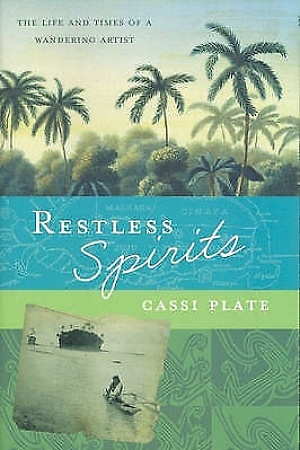The Diplomat
Picador, $32.99 pb, 206 pp
‘My God. The world.’

In Chris Womersley’s novel Cairo (2013), a middle-aged man looks back as his seventeen-year-old self is caught up in the notorious theft of Pablo Picasso’s Weeping Woman from the National Gallery of Victoria by a group of bohemian artists. The heist-Bildungsroman combination is energetic, and decades of distance give Tom Button’s narration a lush, nostalgic quality. His sifted memories of 1986 fall gently, landing somewhere between regret and sustained desire.
The Diplomat is less a sequel to that novel than a coda. Only five years have passed since the theft, and one of the conspirators, Edward Degraves, returns to Australia after spending those years in London. Broken-hearted and insolvent, his heroin addiction possibly in remission, Edward cuts a bleak figure.
Womersley has a gift for atmospheric settings, and his Melbourne circa 1991 is quietly feral and lightly but evocatively drawn. In their Gen X heyday, Brunswick, Fitzroy and St Kilda have a down-and-out energy, a whiff of rot and failure. Visiting recently, I noticed that something of that grim 1990s energy has returned to parts of the city, as if, left alone during lockdown, it has reverted to some weedier nature.
Where Cairo had a warm, soft Instagram filter, The Diplomat offers high-contrast glare. Details are offered sparsely but judiciously: a few moth-eaten lounge chairs, or a flash of red lipstick, can carry an entire scene. Tom’s distance allowed him to write about himself with a degree of self-forgiveness, but Edward’s reflections are firmly on the side of regret. The money is long gone, the dreams of adventure are over. It is fitting that the prose here is starker.
‘Like the exiled monarchs of a kingdom imagined by Lewis Carroll’ is how Edward and Gertrude were described through Tom Button’s eyes in Cairo. We are a far cry from the fantastical now. At thirty-seven, Edward is a lost soul, filled with self-doubt and grief. Having lost Gertrude and sabotaged whatever potential he may have had as an artist, he is not expecting salvation; rather, he is looking for something more fragile, perhaps forgiveness or a thread of grace. As he struggles to keep his addiction at bay, he reflects on sobriety’s raw exposure with a clarity that can be uncomfortable: ‘My God. The world. It was so overwhelming.’
The Diplomat is slow to get going. It’s hard to write about failure and disappointment, about depression and paralysis, without becoming bogged in the sticky mud of your characters’ interior landscapes. It is testament to Womersley’s poise that he gives this tale of woe such emotional momentum. The first-person narration has a deceptively easy rhythm that brings complex ideas and emotions into quick and concentrated focus. The brooding, noirish energy of the book is enticing.
It was Gertrude who had any talent, either as a painter or a forger. In London, she disguised her work as that of an invented Polish painter, sparing her somewhat outmoded style from criticism by setting it in the past. The fraud enables Gertrude to protect her art from commodification while also generating an income. Here, there are echoes of Patricia Highsmith’s Ripley Under Ground, particularly the layering of its enquiry into authenticity. Forgery only works because of the art world’s capacity for self-delusion.
Through its plot and also directly, The Diplomat asks how a work of art acquires its value. What makes a painting good? Is the aura of a work simply the buzz of celebrity? (‘Real art was like charisma,’ Edward reflects.) Is quality merely elusive, or is all art false? Of course, these questions can also be asked of fiction, an art form which is expected to generate a sustained illusion.
As in Cairo, the longing to be an artist has a greater pull than the art itself; Womersley’s artists are driven by an aspiration to be extraordinary people. For Edward, heroin offered a shortcut to countercultural identity: ‘Part of the appeal of drugs ... was of marching to the beat of your own drum, of not doing what everyone else was doing.’
Now the bohemian dream has evaporated, and poverty has lost its sheen. Taking place over a few short days, with flashbacks to Edward’s life in London interspersed like fragile leaves, The Diplomat is a book of disillusionment. Without a belief in art, Edward is left to reckon with the relationships he has sustained or defiled along the way. The only things that might matter are moments of beauty that shimmer with an elusive quality close to the grace our narrator is seeking, but these moments are only understood once they have been lost.
‘As Plato put it: everything that deceives may be said to enchant,’ Edward tells us. I was expecting a swindle at the centre of this novel, but Womersley is less interested in the hoax this time around. Like Highsmith, he wants to unearth the emptiness at which that deceit scratches. In his pared-back descriptions, there is the feeling of a curtain being pulled away. But in that glare, The Diplomat reveals a deep sincerity, a desire to make something meaningful and true – to be worthy.
This sincerity gleams through the grime: in Edward’s clumsy attempt to show care for his father, in the tenderness of grief-struck memory, in the solace of Narcotics Anonymous testimony. The latter reminded me of the way David Foster Wallace sifted through AA meetings in Infinite Jest, looking for authenticity’s trick. You start to wonder: what if there isn’t one?
Though The Diplomat lacks the curious excitement and energetic plot of Cairo, Chris Womersley’s sensitivity and moral depth give weight to this study of human frailty. The novel circles back on itself, the structure gently making its own redemptive offering in the capacity for self-reflection and for change. What’s left is not romantic, bohemian, cool, or ironic; it is something more sustained and affecting. Neither deceit, nor enchantment, after all.











Leave a comment
If you are an ABR subscriber, you will need to sign in to post a comment.
If you have forgotten your sign in details, or if you receive an error message when trying to submit your comment, please email your comment (and the name of the article to which it relates) to ABR Comments. We will review your comment and, subject to approval, we will post it under your name.
Please note that all comments must be approved by ABR and comply with our Terms & Conditions.